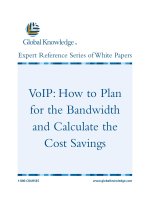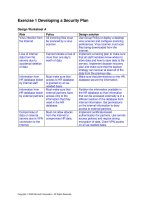PHT-PLN-090223-Test Plan - TK
Bạn đang xem bản rút gọn của tài liệu. Xem và tải ngay bản đầy đủ của tài liệu tại đây (120.46 KB, 12 trang )
TEST PLAN
For
PROJECT BOOK MANAGER SYSTEM
RELEASE 1.0
Revision: 1.0.0.0
Page 1 of 12
Revision History
Date
2-Dec-17
Version
Draft
1.0
Description
Test Plan for 1st iteration
Update
3-Dec-17
1.0
Update
23-Nov-17
Author
Nguyen Trung Tien
Le Anh Thuan
Approved
Dinh Tran Anh
Truc
ww w.en cl aveIT.c om
Page 2 of 12
Table of contents
1. Introduction
1.1 Purpose
1.2 Scope
1.3 Document Terminology and Acronyms
1.4 References
2. Target Test Areas
3. Test Specification
3.1 Features to be tested
4
4
4
4
4
5
6
6
3.1.1 Functional features.............................................................................................................6
3.1.2 User interface features........................................................................................................7
3.2 Features not to be tested
3.3 Test items
3.4 Test Deliverables
4. Milestones &Schedule
5. Test Cycle Entry and Exit Criteria
5.1 Entry Criteria
5.2 Exit Criteria
5.3 Abnormal Termination
6. Environmental Needs
6.1 Hardware and Software
6.2 Productivity and Support Tools
6.3 Test Environment Configurations
7. Roles and Responsibilities
8. Risks and Contingency
7
7
7
8
9
9
9
9
10
10
10
10
11
12
Page 3 of 12
1. Introduction
1.1 Purpose
The purpose of this BCS Test Plan is to define, schedule and monitor the test execution:
- check the quality of the software
- List the Requirements for Test.
- Describe the testing strategies to be employed on each target test functions.
- Identify the required resources and schedule the Test execution
1.2 Scope
This Test Plan is for release
Features to be tested include all software features and combinations of features that should be tested. These software
characteristics, which specified by the requirements documents, consist of:
•
Functions:
•
For a full overall description of BCS Main functions, please refer to SRS
•
User interfaces: All the GUIs for this system.
•
Database related items.
1.3 Document Terminology and Acronyms
DBMS: Database Management System.
For a full list of Terminology and Acronyms, please refer to Definitions, Acronyms and Abbreviation part of this SRS.
1.4 References
1.
Software Requirements Specification (with use-case)
Page 4 of 12
2. Target Test Areas
Test level
Unit Testing
Purpose
Test the internal logic of the modules
Specifications for the testing
BCS Developers will conduct the peer code
reviews and perform unit testing using JUnit
framework.
Integration
Testing
- To see if the modules can be integrated
properly.
BCS Testers will test interfaces between
modules.
- This testing activity can be considered
testing the design.
System Testing
- Test the integrated system and verify
that it meets the requirements defined in
the requirements document.
- The testers will focus on the behavior of the
system (function, screen mapping, error
message…).
Documentation
Testing
- Ensure the User Document has the
following properties:
- BCS staff who is good at English and
communication skills will take responsibility for
this testing.
•
Easy to follow
•
Easy to navigate or find information
•
Reflect what the system requires the
user to do
-
Testing will mirror actual production as much as possible and data flow will be the same as the production
process.
-
Testing will encompass a full cycle for Management with all functions described in the Scope section above.
-
For the purposes of this testing process any of the following will be reported as a bug:
o
BCS does not do something that the requirements and/or design document state that it should and
vice versa.
o
BCS functions wrongly.
o
BCS does something that the requirements and/or design document do not mention.
o
BCS does not do something that the requirements and/or design document do not mention but should
– base on customer feedback. Issues that fall into this category will be clearly identified and brought
to the attention of the Project Manager, as they may constitute a change in project scope.
Page 5 of 12
3. Test Specification
3.1 Features to be tested
33333 Functional features
No.
Features Name
Description
Test Milestones
1
Add books
Add books to the library
system
30-Oct-2017
2
Delete book
Remove book from library
system
30-Oct-2017
3
Edit book
information
Mainly correct the
information related to the
book
31-Oct-2017
4
Print list
Print out the list of book
information in the system
31-Oct-2017
5
Search by title
Display information of the
book to find
1-Nov-2017
6
Exit application
Exit the app
2-Nov-2017
-
Notes
…
Create Project:
+ Add book
+ Delete book
+ Edit book information
+ Print list
+ Search by title
+ Exit app
3.1.1.1 Project Manager
-
-
Define Project
Redefine project
+ Assign leader
+ Create milestone
+ Add technology
Search project
Close project
Evaluate Technical
Evaluate Meeting
Page 6 of 12
33333 User interface features
-
Navigate through menu.
-
Navigate through GUIs.
-
Drag scroll bar of table grid.
-
Click to buttons in each form.
-
Input data for searching, editing...
-
Choose date.
-
Check all, uncheck all.
-
Use hotkeys.
-
Use keyboard and mouse.
-
View error message, warning…
-
Others
3.2 Features not to be tested
TBD
3.3 Test items
T1
ID.
Test Items
Database connection, update, storage
Item Descriptions
Connect the system to user
T2
BCS User Interface
Make user easy to use
T3
BCS Functionalities
Help users with mutiple selections
T4
Edits and Validations
Archive operations and apply
3.4 Test Deliverables
The testing process will produce the following documented deliverables:
-
Test plan.
-
Test cases for modules.
-
System and User Interface test cases.
-
Accurate ongoing reporting of testing status via the bug tracking database
-
A test report delivered at the end of the testing phase and detailing the overall results of testing process.
Page 7 of 12
4. Milestones &Schedule
Milestones
Description
Strategic
Test Plan
Test cases
Build 1
(B090410)
Build 2
(B090410)
Build 3
(B090420)
Final release
(Release 1.0)
Start Date
End Date
20-Oct,2017
21-Oct,2017
Manual test cases
20-Oct,2017
21-Oct,2017
Integration Test
20-Oct,2017
21-Oct,2017
+ Functional Test
+ GUI Test
System Test for feature
Human Resource and
Project Manager
System Test for feature
Human Resource and
Project Manager
System Test for all
system
Page 8 of 12
5. Test Cycle Entry and Exit Criteria
5.1 Entry Criteria
-
PM requests
-
Test plan approved
-
Test cases approved
-
Use cases completed at least 80%
5.2 Exit Criteria
-
All pre-determined test cases must have been executed
-
30% of test fails out of 50% executed test cases
-
The number of bugs exceeds the maximum allowable limit of 50 points. The point classification as following:
o
Critical: 9 points
o
Major: 6 points
o
Minor: 3 points
o
Cosmetic: 1 point
The description of the defect categorization as following:
o
Critical: System crash, lost of data, performance issues
o
Major: Functionality failure, misbehavior, and incorrect representation.
o
Minor: Irritants, functionality achieved through workarounds, usability, UI related.
o
Cosmetic: Spelling and grammatical mistakes, font inconsistency
5.3 Abnormal Termination
-
Code is premature – crash or critical defect occurs often at most every function – Unstable environment
Page 9 of 12
6. Environmental Needs
6.1 Hardware and Software
-
PCs and workstations for installing and running PHT for testing.
-
Server for Database storing.
-
Operating System: Windows XP, Windows Vista,Windouw 7,8,10
-
Database: MySQL.
-
Application Code.
-
Communication equipment.
-
Test Tools: Excel, NUnit, BugZilla.
6.2 Productivity and Support Tools
Tool’s purpose
Tool Name
Unit Testing
Nunit
Defect Tracking
BugZilla, Excel
System test
QTP, WinRunner….
Vendor or In-house
Version
6.3 Test Environment Configurations
Setup the database on the Demo server and grant testers appropriate levels of access.
Provide a copy of the Bug Tracking database so that each tester can record errors from their workstation.
Page 10 of 12
7. Roles and Responsibilities
Activity
Setting Risks
Identify Features to be tested or not tested
Prepare test schedule and milestones
Prepare training plan
Identify exit test criteria
Execution test
Tracking bugs and report
Responsibility
PM, Test Lead
Test Lead
PM, Test Lead
PM, Test Lead
PM, Test Lead
Testers
Testers
Page 11 of 12
8. Risks and Contingency
Risk
Mitigation Strategy
Contingency (Risk is realized)
Change requirements
TBD
TBD
Source code contains one or more
critical defects, which seriously
prevents or limits testing progress.
TBD
TBD
Test cases may overlook critical
business requirements
Check and review all test cases
carefully
Rewrite test cases
Operational, time and resource
constraints
Estimate enough time for testing
Ask for more resources
Hardware/software is not available at
the times indicated in the project
schedule
Prepare all hardware/software
carefully
Ask for another resources
Page 12 of 12









